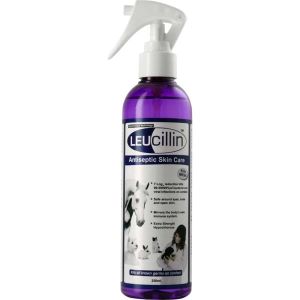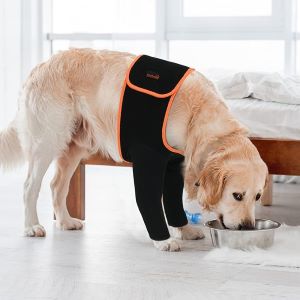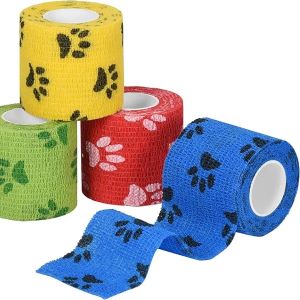Seeing your dog licking the wound to feel better is not something any dog parent wants to see. Licking wounds is not a good habit for dogs, but some people believe that the saliva of a dog increases the process of healing. Which is not entirely true, but more like a myth.
Other the other hand, many people do not want their dog to lick the wound. Instead of healing the wound, it will create more issues. Now the problem is, that many dogs don’t like Elizabethan collars so you might be thinking about how to stop dog licking wound without a collar.
Therefore, it is a very good step to prevent your dog from licking the wound. I have mentioned some alternatives to achieve your goal of stopping your dog from licking his wound.
You Might Also Like:
How To Stop Dog Licking Wound Without a Collar!- Alternatives
Dogs usually don’t feel free in those collars. So it is a good option to find an alternative to a collar. It is better to take action on this as early as possible. Postponing this will put your dog in danger.
“Licking might offer some protection against certain bacteria, but there are serious drawbacks to letting your dog lick wounds. Excessive licking can lead to irritation, paving the way for hot spots, infections, and potential self-mutilation” Stated in American Kennel Club.
Bandaging
Bandaging the wound will not only prevent him to lick it, but also it will help to heal the wound quicker. When a dog licks the wound, it may also transfer the bacteria and germs into his mouth. But the bandage will protect the wound and not let your dog eat the illness.
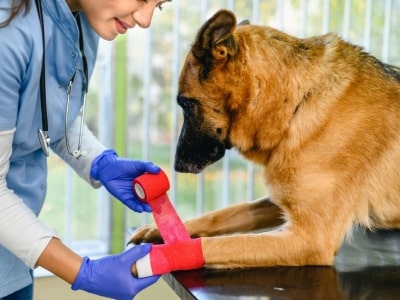
Before you apply a bandage on the wound, make sure you clean the wound first. After you finish cleaning do not just put a bandage on. In order to heal, wounds need oxygen and the wound won’t heal when you tightly apply the bandage.
So make sure to keep some gap between the wound and bandage for air to pass and also not too loose so that it falls when the dog moves.
Now here the problem is many breeds do not like to have anything on their body. They always chew anything which is on their body or remove it from the body. If you realized that your dog also falls into this category then I have the solution.
For heavy chewers, you can use a “no-lick spray“. Basically, this spray has a very bad smell and taste. So, this will not let your dog chew the bandage. It is available in any pet shop or on the online platform.
Surgical Recovery Suit
Covering the wound with a bandage is sometimes a hectic process and heavy chewers dogs make it harder to do. So I have a better option for you. You can also try a surgical recovery suit. Instead of using a collar and making your dog stiff, it is a better option as it will remove all the extra effort.
This suit is more suitable for wounds that are easily lickable by your dog. It is also made of lightweight and soft material. So it allows your dog to get heal without creating any other issues.
Surgical Recovery Suit is available in different styles, sizes, and colors. This means it not only helps your dog to get well soon but also makes him look fashionable.
Use Boots
Most small dog injuries happen in their paws and you cannot stop your dog from roaming around. Now if your dog is walking, the injury might get worse or take more time to heal. Therefore, it would be better to have protection on their paws or legs.
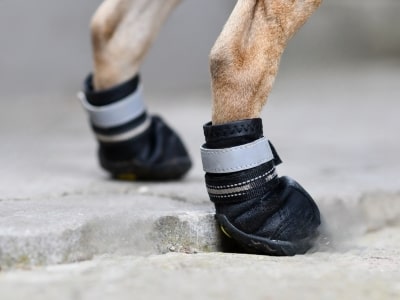
Their paws are the place where they can easily approach to lick. Not any other part of the body but boots will make sure that their paws are entirely safe. Especially when you are trying to protect the bandage by using boots. It will keep it tight and will prevent the dog to lick.
Unfortunately, some dogs do not like the boots. They either chew it or remove it anyhow. Therefore it is better to try it once and make sure that your dog likes it.
Make a Distraction
Distracting your dog from the pain of the wound can be a good option. It doesn’t mean you give him a bowl of food, It will only keep him distracted for a few minutes. Also if you have applied a bandage and he is trying to chew it then distracting will definitely work for you.
The only condition is, you have to do that thing which keeps him busy for a long time. I have mentioned things you can do to distract him below.
- You can play with him by hiding his treat somewhere and telling him to find it. It will make him happy also when your furry friend will find his hidden treat by using his super-smelling power.
- You can take him on a walk near your house if the wound is not on his leg. Going outside will always make your dog happy.
- Take your dog to the backyard or in the garden and play with him. Dogs never say no to playing. You can use several things to play with him like ball, frisbee, or bone.
- Kongs stuffed with his favorite treat will eat his time and totally. And give a strong plastic bottle with holes in it by stuffing smashed biscuits. The dog will chew it and slowly he will enjoy the biscuits.
- Use this time to teach some extra useful skills. You can train him to behave better and obey your command.
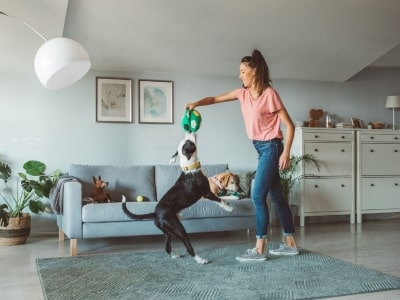
Distracting him is good but sometimes your dog wants to convey a message to you and you should not ignore it. You should consult your vet.
Why Do Dogs Lick Their Wound?
Every dog owner might be thinking why their dog is licking their wound, does it mean something? But I am going to tell you why they lick their wound. It is because they feel less pain when they lick the wound.
“It is a common misconception that letting dogs lick at their wounds is beneficial and will help them heal. While there is a little truth to this, dogs in general tend to lick their wounds excessively, which can cause a number of problems.”, says Brittany Grenus, DVM from PetMd.
Suppose you hit your elbow or head somewhere and your immediate action will be rubbing the area until it feels okay. In the same way, they lick their wound until it feels okay.
Definitely, saliva has a small amount of anti-bacterial properties but it won’t heal the wound if they constantly lick them. So to prevent them from licking the wound you should know how to stop dog licking wound which I have mentioned.
FAQs
Is it OK if my dog licks her stitches?
No, you should not allow dogs to lick their wound or incision as it can be harmful to your pooch. If he does, there are chances that he develops an infection or ends up pulling out stitches and hurting himself.
Does dog saliva heal wounds?
Yes and no. There is a particular protein in a dog’s saliva called histatins which helps to fight against infection. Also, there are certain chemicals that are beneficial to heal the wound. And research says that dogs who lick their wound heal faster than non-licker dogs.
Can I put socks on my dog to stop licking?
Putting socks on your dog’s wound will prevent him from licking and it is one of the easiest ways to stop him from licking. Few dogs do not like booties while walking but small socks will not be an issue for them.
Can I use a bitter spray to stop my dog from licking its wound?
Yes, the bitter spray is particularly designed for dogs to prevent them to lick their wounds. This spray contains a substance that tastes bitter and also smells bad. Therefore, dogs avoid licking that particular area because of its bad smell and bitter taste.
How long should I keep my dog from licking the wound?
You need to prevent your dog from licking the wound until it gets fully healed. The healing process varies by what kind of wound it is. It can take some weeks or months. It is better if you consult your vet about it.
Final Thoughts
I hope you understand how to stop dogs from licking wounds without a collar and why it is necessary. It is necessary to prevent your dog from licking its wound as there are more disadvantages than benefits of licking its wound. But before you apply any method to prevent your dog to lick the wound, you should consult your vet.
Now whatever technique you use, you should constantly monitor your dog and if your method does not work then you should again ask your vet for more pieces of advice.
Reference:
- Morandi, E. M., Pauzenberger, R., Tasch, C., Rieger, U. M., Pierer, G., & Djedovic, G. (2017). A small ‘lick’ will sink a great ship: Fulminant septicaemia after dog saliva wound treatment in an asplenic patient. International Wound Journal, 14(6), 1025-1028. https://doi.org/10.1111/iwj.12752
- Care of Open Wounds in Dogs | VCA Animal Hospital. (n.d.). Vca. Retrieved March 6, 2024, from https://vcahospitals.com/know-your-pet/care-of-open-wounds-in-dogs
- First aid for cuts and grazes. (n.d.). PDSA. Retrieved March 6, 2024, from https://www.pdsa.org.uk/pet-help-and-advice/pet-health-hub/medications/first-aid-for-cuts-and-grazes
